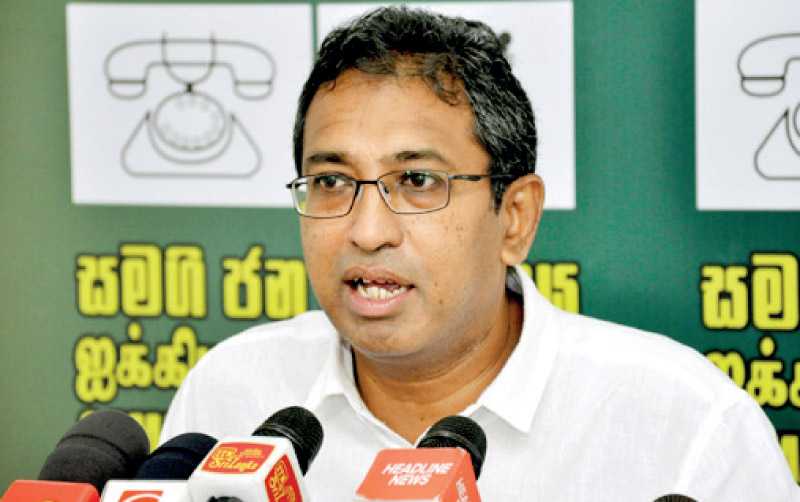Monday Feb 23, 2026
Monday Feb 23, 2026
Friday, 16 October 2020 04:01 - - {{hitsCtrl.values.hits}}

SJB parliamentarian Dr. Harsha de Silva outlining Sri Lanka’s debt challenges yesterday
By Asiri Fernando
To avoid the worst case scenario of a sovereign default next year Samgi Jana Balawegaya (SJB) parliamentarian Dr. Harsha de Silva yesterday called on the Government to boost investor confidence by earnestly working on an agreement with the International Monetary Fund (IMF) and prepare for debt re-profiling.
De Silva made these statements when he raised alarm regarding concerns expressed by international investment bank Morgan Stanley on the options open to the Sri Lankan Government if it is unable to meet local and foreign debt repayments of about $ 9 billion, needed over the next 12 months.
Sri Lanka has already met the bulk of its debt repayments for 2020 including a $ 1 billion sovereign bond repayment in October. However the country will have to repay about $ 4.5 billion in debt in 2021, and faces multiple challenges due to COVID-19 and a rating downgrade. Analysts have said Sri Lanka will find it difficult to raise the money from international financial markets as interest rates have spiked significantly, and it does not have the reserves to meet debt repayments.
The Finance Ministry has also said it is not seeking a deal with the IMF, something which De Silva believes would have helped bolster market confidence.
Economist Dr. Harsha de Silva citing a recent report by Morgan Stanley that pointed to a possible “tail risk scenario” regarding Sri Lanka’s lack of debt repayment capability, told reporters the Government had to step up and disclose why it was refraining from reaching out to the IMF. He argued that this was the first time that a major investment bank had issued such a warning for Sri Lanka and it should be taken extremely seriously.
“This term ‘tail risk scenario’ is normally used by international financial markets to predict an event which has a low probability of happening, but can happen. I must stress they are not saying this will happen but that there is a probability it will happen. But this is a very, very serious situation and the Government must address it.”
De Silva noted that Morgan Stanley had indicated Sri Lanka may have to halt repayment on debt for 18 months, and may be forced to restructure repayment of what is owed over the next five years.
“This has never happened before. One of the leading investment banks in the world, Morgan Stanley, has predicted this a few days ago. This comes after Moody’s downgrade.”
He also criticised the Government’s reluctance to seek assistance from the IMF, arguing that such a move further erodes investor confidence and could leave Sri Lanka with fewer suitable options to pursue. He argued that the stance taken by the Government had a negative effect on investors at a time Sri Lanka needed them the most.
“The Sri Lankan authorities have held a few investors calls over the past few days. Sri Lanka-Euro bonds have fallen 5 to 10 points following those calls as the authorities indicated the lack of urgency in engaging with the IMF for a support program. Thereafter, Moody’s further downgraded Sri Lanka by further two notches, which lead to another 3 to 4 points dropping,” he quoted Morgan Stanley’s report, arguing that the Government’s debt repayment planning was flawed.
“We must never forget that the international markets rely on confidence, but when our officials state that Sri Lanka doesn’t need to seek assistance from the IMF, investors see that Sri Lanka will likely not be able to meet her debt efficiently.
“We call on the Government to understand the reality and prepare a way forward without acting irresponsibly.”
De Silva went on to warn that if a re-profiling of debt is not done, it could lead to a restructuring of debt. He argued that restructuring debt would have a disastrous impact on Sri Lanka, and that re-profiling debt would be a more manageable proposition.
“If the Government doesn’t go for a re-profiling of debt, they will have to raise a very large amount of money next year. So, the Government should stop playing politics with this situation and take this matter seriously.”